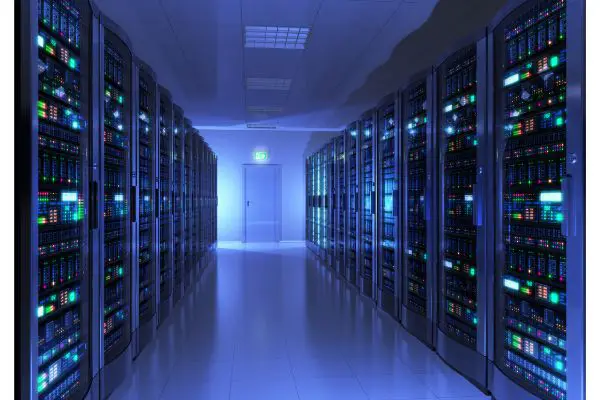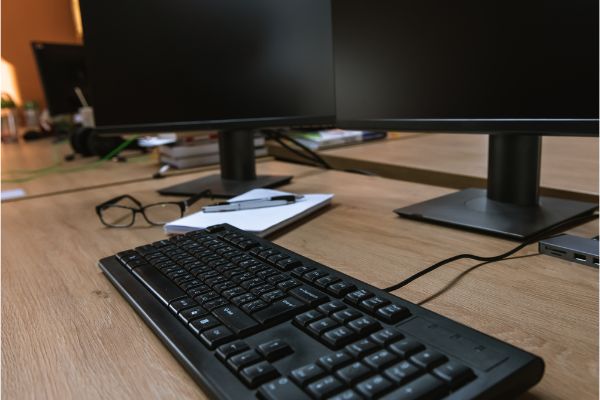Disclaimer: This post may contain affiliate links, meaning we get a small commission if you make a purchase through our links, at no cost to you. For more information, please visit our Disclaimer Page.
Desktops, laptops, tablets, and even smartphones are different form factors for computers, and each one can perform some related yet different functions.
We might not think of anything beyond the standard desktop rigs or laptops we use for business as computers. Still, the technology that goes into this category can vary in scope or size, and a server hard drive is just one of the many pieces that can fit here. Servers provide support or applications to other computers; these other machines can use the server to perform various tasks.
Although they share some common ground, servers behave differently from your standard devices. This could lead some users to wonder whether server hard drives themselves have applications far removed from the more traditional drives.
We will talk about that, any significant differences between desktop drives and servers and whether you might be able to use an enterprise server for regular applications and gaming.
Table of Contents
Can I Use a Server Hard Drive in a Desktop?
Before we get into the possibilities of using a server hard drive in a desktop, it is important to understand these two things. We will get into some of their major differences in our next section. For now, you can think of a server as a bigger, more robust version of your own desktop.
In terms of hardware, servers and traditional desktops can be surprisingly similar. However, servers are designed to handle requests that are in the interests of other machines, rather than one computer sending out and “answering” its own requests to perform its own functions.
Therefore, it is not uncommon for some server hard drives to have extra capacities or hardware to scale higher than your average HDD. A server needs to be able to accommodate multiple machines in most cases.
With all that said, you can use a server hard drive in a desktop. Whether this is the ideal scenario for you depends on how you plan to use it, but the possibility does exist for those who want to try it. For the purposes of our article, we will assume that some users might want to put a server HDD inside a single desktop rig that might otherwise use more traditional hardware.
There are a few caveats that might come with this route, and what these are might depend on your rig’s specific make and model. The drives themselves will have different specifications, but you could run into two basic issues when putting a server HDD in your regular desktop.
The first possibility that might not work for some users is noise. This aspect mostly applies to full servers, but you could run into the issue with a basic server HDD, too. Servers and their parts tend to be much louder than some people might be used to with standard PCs.
Some users might go so far as to set up a dedicated server in a completely different room from that of their regular desktops. This keeps the noise levels down, and servers usually run on their own to provide things for other rigs anyway, so there is not a lot of need to monitor them constantly.
A second issue could be power consumption. Again, this mainly speaks to full servers, but their parts often need far more power than your regular rig to run. As we touched on, they are dealing with multiple processes daily and are expected to run every day.
While it is possible to shut down a server, it does not happen with nearly the frequency that it does in traditional desktops. We’re just discussing a server-grade hard drive in this case, but that piece of tech may still need extra power to run at good levels.
What Is the Difference Between a Server HDD and a Desktop HDD?
We touched on the fact that server parts can be different from your regular options, but how are the hard drives different from each other, specifically? The true answer to this question might depend on your comparison models.
In general, however, there are a few key things that stand out when it comes to stacking up server-grade hard drives against their consumer-grade counterparts:
1. Server HDDs tend to be more robust. This isn’t necessarily a given, but we’re dealing with hardware designed to run more consistently and regularly than your standard drive. You want something that can take several days, weeks, or even months of continuous use and still operate like it’s new.
2. A server drive will probably have much higher read/write speeds in most cases. The server needs to be able to process things for multiple other machines that use it at once, so it needs to handle tons of requests quickly. On a related note, it will probably spin at higher RPMs than your usual hard drive.
3. If you purchase a true server-grade HDD, it should have some extra capabilities regarding RAID. RAID is a way to set up redundancy measures if a drive goes down, and server drives have special configuration options for this that most other HDDs for consumers may not.
4. While it can vary from manufacturer to manufacturer, server-grade drives tend to have much longer warranty times than their regular counterparts. Given how server HDDs are expected to run at higher speeds and without interruption, this offer makes sense for many companies that develop drives of this type.
Can I Use an Enterprise Hard Drive in My Desktop?
An enterprise hard drive is typically part of what the tech world calls an enterprise server. The form factors have changed a bit over the years, but you can think of enterprise servers like the large computer mainframes you might have seen filling up entire rooms.
These servers host a huge collection of programs and are designed to facilitate processes between many other computers that might be on the same network.
They tend to have lots of memory and can run at high speeds. Some developers use the term “enterprise” to imply that the server has a high level of reliability and is fault resistant.
Whether you can use an enterprise drive for a desktop might depend on the specific model. There are many enterprise drives, and they can vary quite a bit from each other. In truth, some of these drives are close to regular desktop HDDs but with firmware changes that make them different from desktops.
Specific models may have other changes that could make them less attractive for use in your regular rig, but there are many kinds you can try out. As we mentioned earlier, noise could be a problem with any of them, but it depends on how you might use the drive.
However, if the interface is compatible with your rig, you should be able to use an enterprise server HDD in your desktop. Compatible interfaces here would refer to things like SATA computer bus interfaces and the like. If you don’t mind the noise and can hook it up physically, there is a good chance that you can use it.
Can Enterprise Hard Drives Be Used for Gaming?
Gaming, specifically, might be a different matter regarding server-grade hard drives. Most modern games are resource-intense processes, particularly if you want to run them on the highest specs possible.
Anything that is intense with its use of resources will need a lot of cooling to keep the PC parts from overheating. Further, server HDDs tend to run hotter and louder than their regular counterparts by default.
If you add in the possibility of programs like games that will further tax the system and need regular, quite intense cooling, there could be some issues.
This doesn’t mean using an enterprise server for gaming is impossible. Games that are running will want to access data almost constantly, and server-grade HDDs are good for this kind of thing. If you get a robust, fast server hard drive, you may see some nice improvements to your overall gaming setup.
However, remember that such things will also rely on what else you are running in your rig. It is possible to use such a drive for gaming, but players must be mindful of adding extra cooling options to ensure components don’t take on too much heat.
Conclusion
Most regular desktop hard drives that you can find on the market will be perfectly suitable for the needs of your average user. That said, some server HDDs are designed to be heartier, and they should be able to handle more continual processes.
Some are beefed-up versions of consumer drives, but nearly all should have different firmware and longer warranty periods than their counterparts. With a few extra considerations, you should be able to run server-grade drives in regular desktops or gaming PCs.


